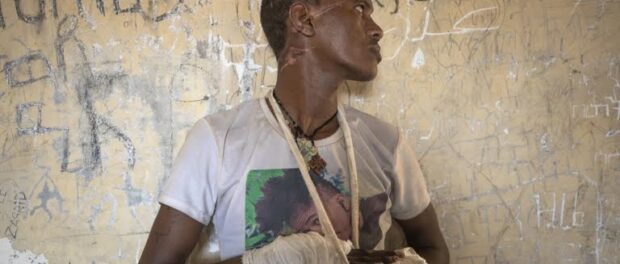‘Extreme brutality’: U.N. finds evidence of atrocities in Ethiopia’s yearlong war

GENEVA — The United Nations human rights chief said Wednesday that Ethiopia’s yearlong war in its northern Tigray region has been marked by “extreme brutality,” with a joint investigation faulting all sides for committing abuses but with the “big numbers of violations” linked to Ethiopian forces and those from neighboring Eritrea.
The investigating committee was hampered by authorities’ intimidation and restrictions and didn’t visit some of the war’s worst-affected locations.
The report, a rare collaboration by the U.N. human rights office with the government-created Ethiopian Human Rights Commission, was released a day before the war’s one-year mark and as Africa’s second-most populous country enters a new state of emergency, with rival Tigray forces threatening the capital, Addis Ababa.
The U.N. told the Associated Press that the collaboration was necessary for its team to gain access to a troubled region that Ethiopian authorities have largely prevented journalists, rights groups and other outside observers from entering.
The conflict in Ethiopia’s Tigray region has killed thousands of people since Prime Minister Abiy Ahmed’s government allowed soldiers from Eritrea to invade Tigray and join Ethiopian forces in fighting the Tigray forces that had long dominated the national government before Abiy took office. Ethnic Tigrayans across the country have since reported being targeted with arbitrary detentions, while civilians in Tigray have described gang rapes, famine and mass expulsions.
“In western Tigray, it was apparent that the Tigrayans had left most of the areas, as it was difficult to find Tigrayans to interview,” the new report says.
A Tigray woman who fled the conflict in Ethiopia’s Tigray region, carries water on her back, at Umm Rakouba refugee camp in Qadarif, eastern Sudan, Friday, Nov. 27, 2020. Ethiopian Prime Minister Abiy Ahmed again ruled out dialogue with the leaders of the defiant Tigray region Friday but said he was willing to speak to representatives “operating legally” there during a meeting with three African Union special envoys trying to end the deadly conflict between federal troops and the region’s forces.
I reported on Ethiopia’s secretive war. Then came a knock at my door
Feb. 11, 2021
The joint investigation covers events until late June, when the Tigray forces regained much of their region, but it failed to visit some of the deadliest sites of the war, including the city of Axum, because of security and other obstacles. Notably, the report says, those obstacles included the Ethiopian government’s failure to release satellite phones procured for the investigation — crucial tools, as phone and internet service are cut off in Tigray.
The investigation says all sides, including forces from the neighboring Amhara region that have claimed western Tigray, have committed abuses, which may amount to crimes against humanity and war crimes. Without breaking much new ground, the report confirms in general the abuses described by witnesses throughout the war.
But it gives little sense of scale, saying only that the more than 1,300 rapes reported to authorities are likely far fewer than the real number.
Despite the report’s shortcomings, the prime minister’s office said in a statement that it “clearly established the claim of genocide as false and utterly lacking of any factual basis.” Ethiopian Human Rights Commission chief Daniel Bekele said the investigation didn’t identify violations amounting to genocide, but the U.N. did not go that far.
Tigray people who fled the conflict in Ethiopia’s Tigray region, walk at Umm Rakouba refugee camp in Qadarif, eastern Sudan, Friday, Nov. 27, 2020. Ethiopian Prime Minister Abiy Ahmed again ruled out dialogue with the leaders of the defiant Tigray region Friday but said he was willing to speak to representatives “operating legally” there during a meeting with three African Union special envoys trying to end the deadly conflict between federal troops and the region’s forces.
A rape survivor’s story emerges from a remote African war
Feb. 11, 2021
The prime minister’s statement noted “serious reservations” about the report but claimed that it had laid “sinister allegations to rest.” It said the government acknowledged the need to “redouble our efforts” to hold perpetrators accountable. A high-level task force is to be formed.
According to the report, several Ethiopian military camps were used to torture captured Tigray forces or civilians suspected of supporting them. Others were detained in “secret locations” and military camps across the country, with arbitrary detentions in many cases. For their part, Tigray forces detained some ethnic Amhara civilians in western Tigray in the early days of the war on suspicion of supporting the military, and in some cases tortured them.
“The Tigray conflict has been marked by extreme brutality. The gravity and seriousness of the violations and abuses we have documented underscore the need to hold perpetrators accountable on all sides,” said Michelle Bachelet, the U.N. high commissioner for human rights. Reports of abuses such as summary executions in Tigray continue, she said.
But the report gives little indication that Eritrean soldiers were responsible for many of the atrocities, as witnesses have alleged from the earliest days of the war. Before March, Abiy denied that Eritrean forces were even in the country.
Ethiopian Prime Minister Abiy Ahmed at the European Council headquarters in Brussels on Jan. 24.
WORLD & NATION
In Ethiopia, a Nobel Peace laureate goes to war
Dec. 6, 2020
Bachelet told reporters that while the report doesn’t explicitly mention that Ethiopian and Eritrean forces were responsible for the majority of the violations, “I would say that the big numbers of violations of human rights are linked to the Ethiopian and Eritrean defense forces.” She also noted “disturbing suggestions of ethnically motivated violence” that warrant further investigation.
